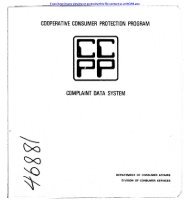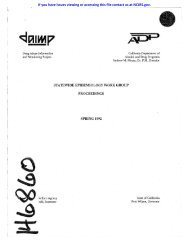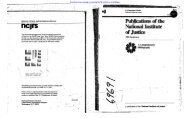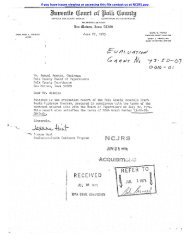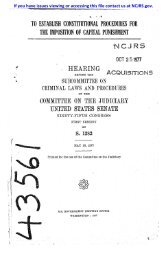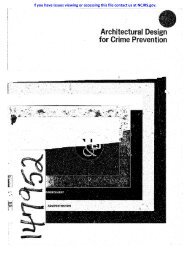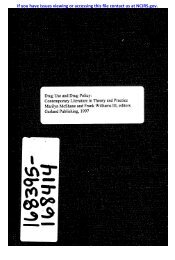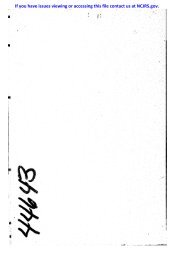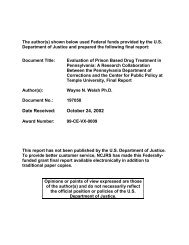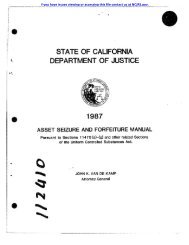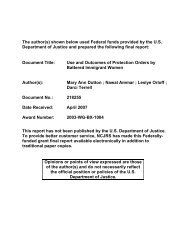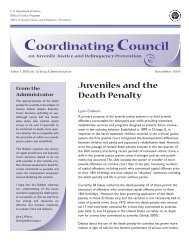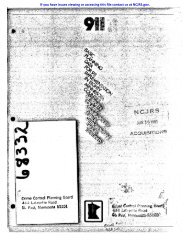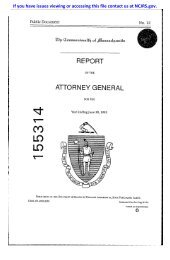Conflict Resolution Education - National Criminal Justice Reference ...
Conflict Resolution Education - National Criminal Justice Reference ...
Conflict Resolution Education - National Criminal Justice Reference ...
Create successful ePaper yourself
Turn your PDF publications into a flip-book with our unique Google optimized e-Paper software.
♦ Critical thinking abilities encompass the behaviors<br />
of analyzing, hypothesizing, predicting,<br />
strategizing, comparing/contrasting, and evaluating.<br />
Critical thinking abilities include:<br />
Recognizing existing criteria and making<br />
them explicit.<br />
Establishing objective criteria.<br />
Applying criteria as the basis for choosing<br />
options.<br />
Planning future behaviors.<br />
Although these foundation abilities are necessary<br />
to the successful implementation of the problemsolving<br />
processes of conflict resolution, programs<br />
that teach only these skills are not genuine conflict<br />
resolution programs.<br />
Steps in the Problem-Solving<br />
Process<br />
Genuine conflict resolution programs require two<br />
major components: the principles of conflict resolution<br />
(separate the people from the problem; focus on<br />
interests, not positions; invent options for mutual gain;<br />
and use objective criteria as the basis for decisionmaking)<br />
and a problem-solving process (negotiation,<br />
mediation, or consensus decisionmaking). The conflict<br />
resolution processes are characterized by a series<br />
of steps that enable the disputants to identify<br />
their own needs and interests and to work cooperatively<br />
to find solutions to meet those needs and<br />
interests. Each process gives support and direction<br />
to the cooperative effort, assisting the parties to stay<br />
focused on the problem rather than on each other<br />
and to find a mutually acceptable resolution. In addition,<br />
genuine conflict resolution education programs<br />
include extensive training and practice using the<br />
principles and problem-solving processes of conflict<br />
resolution.<br />
The six steps in each problem-solving process are:<br />
♦ Set the stage.<br />
♦ Gather perspectives.<br />
♦ Identify interests.<br />
12<br />
♦ Create options.<br />
♦ Evaluate options.<br />
♦ Generate agreement.<br />
Approaches to <strong>Conflict</strong><br />
<strong>Resolution</strong> <strong>Education</strong><br />
There are four basic approaches to conflict resolution<br />
education in operation across the country:<br />
♦ Process Curriculum: An approach to conflict<br />
resolution education characterized by devoting<br />
a specific time to teaching the foundation abilities,<br />
principles, and one or more of the problemsolving<br />
processes of conflict resolution as a<br />
separate course, distinct curriculum, or daily<br />
lesson plan.<br />
♦ Mediation Program: A conflict resolution education<br />
program in which selected individuals (adults<br />
and/or students) are trained in the principles and<br />
foundation abilities of conflict resolution and in<br />
the mediation process in order to provide neutral<br />
third-party facilitation to assist those in conflict<br />
to reach a resolution.<br />
♦ Peaceable Classroom: A whole-classroom methodology<br />
that includes teaching students the foundation<br />
abilities, principles, and one or more of<br />
the three problem-solving processes of conflict<br />
resolution. <strong>Conflict</strong> resolution education is incorporated<br />
into the core subjects of the curriculum<br />
and into classroom management strategies. Peaceable<br />
classrooms are the building blocks of the<br />
peaceable school.<br />
♦ Peaceable School: A comprehensive wholeschool<br />
methodology that builds on the peaceable<br />
classroom approach by using conflict resolution<br />
as a system of operation for managing the school<br />
as well as the classroom. <strong>Conflict</strong> resolution principles<br />
and processes are learned and utilized by<br />
every member of the school community—librarians,<br />
teachers, counselors, students, principals,<br />
and parents.



